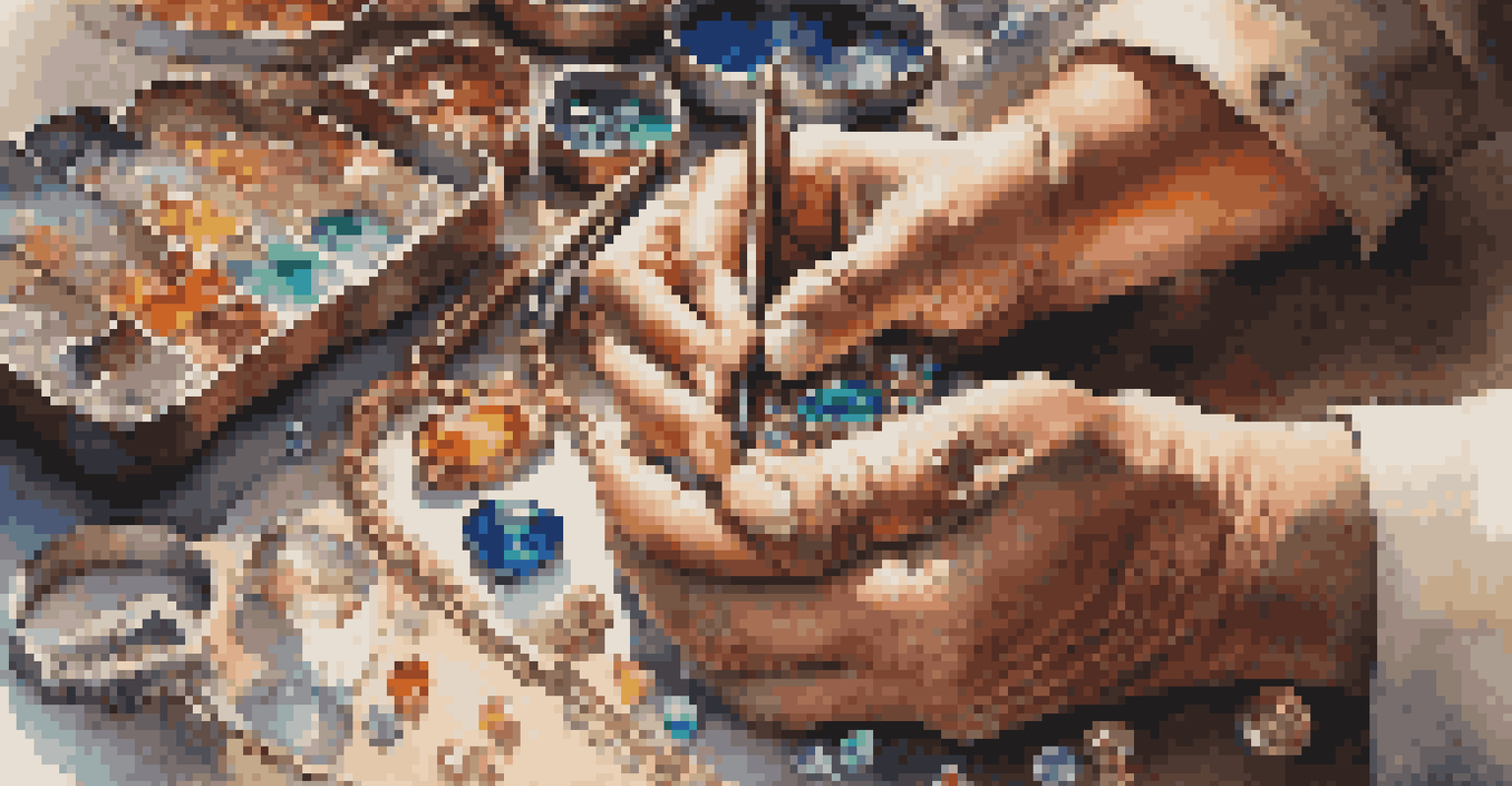The Importance of Fair Trade Practices in Luxury Goods

What is Fair Trade and Why Does It Matter?
Fair trade is a social movement aimed at creating equitable trading conditions for marginalized producers, particularly in developing countries. It ensures that these producers receive fair compensation for their labor, promoting sustainable practices and community development. In the luxury goods market, it plays a crucial role in enhancing the ethical standards of production and consumption.
Fair trade is about making sure that producers get a fair price for their goods and have safe working conditions.
By prioritizing fair trade, luxury brands can foster transparency in their supply chains, allowing consumers to make informed choices. It’s not just about the product; it’s about the story behind it. When consumers understand the positive impacts of their purchases, they are more likely to support brands that align with their values.
Moreover, fair trade practices contribute to the overall reputation and credibility of luxury brands. In a world increasingly driven by social responsibility, companies that embrace ethical sourcing can differentiate themselves in a crowded marketplace.
The Impact of Fair Trade on Artisans and Producers
For artisans and producers, fair trade means more than just better wages; it provides stability and opportunities for growth. Many artisans, especially in developing nations, rely on luxury brands to showcase their craftsmanship on a global stage. Fair trade ensures they are compensated fairly, allowing them to invest in their skills and communities.

Additionally, fair trade practices often incorporate training programs that enhance the artisans' abilities to produce high-quality goods. This not only improves their economic situation but also elevates the quality of the products they create. Imagine a talented artisan being able to refine their craft and expand their business—this is the transformative power of fair trade.
Fair Trade Enhances Brand Reputation
Luxury brands that prioritize fair trade practices can improve their credibility and differentiate themselves in a socially responsible marketplace.
Ultimately, when luxury brands commit to fair trade, they contribute to the preservation of traditional crafts and cultural heritage. By valuing artisanship, they help keep these unique skills alive for future generations, enriching the global market with diversity and authenticity.
Consumer Behavior: The Shift Towards Ethical Luxury
Today’s consumers are increasingly aware of their purchasing power and its implications. Many are shifting towards ethical luxury, seeking products that not only reflect quality but also align with their personal values. This trend is a direct response to a growing consciousness about social and environmental issues.
The future of luxury is about responsible sourcing and ethical production.
When consumers choose fair trade luxury goods, they are making a statement about the kind of world they want to support. They are opting for products that empower communities rather than exploit them. This shift in consumer behavior is encouraging brands to adopt more sustainable practices, creating a positive feedback loop.
Moreover, luxury brands that emphasize their commitment to fair trade often attract a loyal customer base. Shoppers appreciate transparency and are more likely to advocate for brands that prioritize ethical practices, leading to increased brand loyalty and word-of-mouth promotion.
Environmental Sustainability in Fair Trade Practices
Fair trade is not just about people; it also encompasses environmental sustainability. Many fair trade standards require producers to adopt eco-friendly practices, minimizing their environmental impact. This is particularly important in industries like fashion and jewelry, where resource extraction and production can have serious ecological consequences.
By supporting fair trade, luxury brands can contribute to the preservation of natural resources. For example, fair trade cotton is grown without harmful pesticides, benefiting both the environment and the health of the farmers. This holistic approach ensures that social, economic, and ecological concerns are addressed simultaneously.
Shift Towards Ethical Consumerism
Consumers are increasingly choosing ethical luxury products, reflecting their values and supporting brands that empower communities.
Furthermore, as consumers become more environmentally conscious, they are increasingly drawn to brands that demonstrate a commitment to sustainability. By integrating fair trade practices, luxury brands can meet this demand while also enhancing their brand image.
Challenges Facing Fair Trade in the Luxury Sector
Despite its many benefits, fair trade in the luxury sector is not without challenges. One significant hurdle is the perception that luxury goods should only be associated with exclusivity and high price points. This can create a disconnect with the principles of fair trade, which emphasize accessibility and equitable pricing.
Moreover, the certification process for fair trade can be complex and costly, particularly for smaller luxury brands. Many may hesitate to commit to fair trade standards due to the financial implications. This can hinder the growth of fair trade practices within the luxury market.
Finally, there's the issue of consumer education. Many shoppers may not fully understand what fair trade entails or its importance. Bridging this knowledge gap is essential for increasing demand for fair trade luxury goods and encouraging more brands to adopt these practices.
The Role of Luxury Brands in Promoting Fair Trade
Luxury brands have a unique opportunity to influence the market by promoting fair trade practices. By choosing to source materials ethically and support artisan communities, they set a precedent for others in the industry. Their visibility and prestige can shine a light on the importance of fair trade, encouraging consumers to prioritize ethical purchases.
Additionally, luxury brands can use their platforms to educate consumers about the benefits of fair trade. Through storytelling and transparency in marketing, they can share the journeys of the artisans and producers behind their products. This not only enriches the consumer experience but also fosters a deeper connection between the buyer and the product.
Future Growth in Ethical Luxury
The luxury goods sector is expected to integrate more fair trade practices as technology and consumer awareness drive demand for transparency.
Ultimately, when luxury brands embrace fair trade, they can drive significant change in the industry. Their commitment not only enhances their brand value but also promotes a more equitable global economy, showcasing that luxury and responsibility can go hand in hand.
Future Trends: Fair Trade and Luxury Goods
As we look to the future, the integration of fair trade practices in the luxury goods sector is likely to grow. With the rise of socially conscious consumers, brands that prioritize ethical sourcing are poised to lead the market. This shift signifies a broader movement towards sustainable luxury that respects both people and the planet.
Moreover, technological advancements may enhance the traceability of luxury goods, making it easier for consumers to verify the ethical claims of brands. As blockchain technology and similar innovations gain traction, transparency will become even more achievable. This will allow consumers to track the origins of their purchases and ensure they align with fair trade principles.

In conclusion, the future of luxury goods is undoubtedly intertwined with fair trade practices. As awareness and demand continue to rise, luxury brands must adapt and evolve to meet the expectations of their consumers, paving the way for a more ethical and sustainable market.